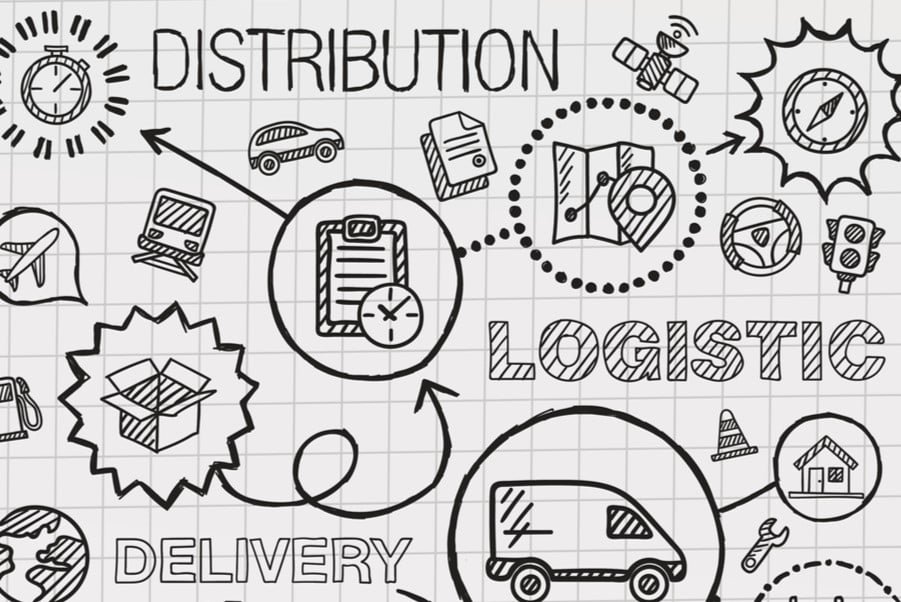Logistics
Warehousing & Fulfillment
Transportation
E-commerce
E-commerce Fulfillment Services
Lease & Maintenance
Semi Trucks
Supply Chain Technology
Logistics
E-commerce
Lease & Maintenance
Buy Used Trucks

As challenges and disruptions continually plague supply chains, many companies turn to a seasoned third-party logistics (3PL) provider to navigate the challenges, complexities, and unpredictability. Issues include demand fluctuations, transportation bottlenecks, and ever-rising customer expectations.
The global nature of supply chains also leaves them vulnerable to armed and diplomatic conflicts. Fundamentally, supply chains rely on supply and demand, and any disruption in one aspect has a domino effect on the system. It’s a complex system and a challenge to solve, but the desired end result is constant: customer satisfaction.
Overcoming supply chain challenges is not for the timid or inexperienced. This is why a 3PL partnership is so valuable – it offers expertise and cost effectiveness. Most companies do their due diligence and choose what they believe is the best provider. But months (or even years) down the line, cracks begin to show in both the relationship and the performance.
In this article, we’ll explore why companies partner with 3PL providers, why complacency wrecks performance and how to minimize it, the right questions to ask to ensure you’re partnering with the right 3PL, and how to manage that relationship to prevent complacency.
When you partner with a 3PL, you hire more than services for transportation, warehousing, picking and packing, inventory forecasting, order fulfillment, packaging, and freight forwarding. You’re hiring logistical experts adept at navigating the ever-changing supply chain. Many of the benefits include:
Cost savings
Because 3PL providers serve multiple customers, they provide better rates than shipping yourself because they leverage their collective volume and order frequency.
Expertise
Logistics are complicated and confusing, and managing them can be a nightmare. A 3PL provider uses offers services and guidance, helping fine-tune logistical operations to save money and save time, allowing you to focus on growing your business.
Risk mitigation
Some supply chain disruptions are predictable, or they linger so long that you can plan for them. More often, however, they’re surprises. Events such as geopolitical conflicts, natural disasters, labor strikes, and pandemics all create headaches for the supply chain. When disruptions emerge, you trust your 3PL to shoulder these problems and find solutions.
A better customer experience.
Let’s not forget the real boss – the customer. They expect speedy delivery of the correct item, or they will take their business elsewhere. A 3PL and its extensive resources mean faster delivery through efficient and established distribution networks.
The promise
Partnerships and relationships rely on promises made and fulfilled. When you interview 3PLs, you’ll find they all promise best-in-class performance, a lean culture that reduces waste and creates the best experience, and a philosophy of continuous improvement. Everything is great. Until…
While every 3PL will likely make the same promises, some can’t fulfill them. When a partnership begins, everyone is excited, everything is terrific, and there’s a fresh feeling of optimism. But then, the cracks start to appear. You find:
Another sign of complacency is poor communication. Communication should be consistent and seamless; the 3PL should be an extension of your operations that feels like a seamless part of your team.
“Good enough” doesn’t do the job. Rather than making your company fit into a rigid mold, your 3PL partner must be responsive to your specific needs and retain its enthusiasm for your business, exceeding rather than just meeting expectations and keeping promises made. It’s disappointing at best and catastrophic at worst when your 3PL fails you. So, what can you do?
Opacity is the enemy of an efficient supply chain. End-to-end transparency powered by current technology is key. Your 3PL’s operational transparency is equally important. Do they have the right stuff? Do they plan, anticipate, staff appropriately, and process orders efficiently? Or, are they always playing catch-up? What actually goes on behind the scenes?
When reviewing 3PL providers RFPs, they must provide a planning roadmap and practice continuous improvement. Share your business goals and pain points with the 3PL to ensure you’re moving in the same direction, especially in competitive bid situations. Asking probing questions means learning details regarding technology, resourcing, and business philosophy to make the best choice.
Does the 3PL have adequate resources to not only meet current expectations but flex with changes and sustain continuous improvement? Ask the right questions:
Transparency is easy in the beginning stages, but to have a successful 3PL partnership, it must be sustained. You and your 3PL should work in tandem, sharing forecasts, pain points, and goals consistently and regularly. Remember: your 3PL is an extension of your team, not an entity to hold at arm’s length.
Success comes from communication, collaboration, and mutual understanding.
Continuous improvement is a commitment to continued advancement, not only in process and operations but in your partnership with your 3PL. Many pay lip service to the philosophy of reducing waste and cost, but execution falls short.
Your 3PL should convey goals for continuous improvement, how it measures progress, metrics used, and, again, who is responsible. It’s a good idea to include constant-improvement commitments in the Statement of Work for accountability. This is vital for your company’s sustained growth and performance, so hold your 3PL to its promises.
As business environment grows increasingly complex, the intricacies of the supply chain are the last thing you need to worry about. That’s why partnering with the right 3PL is essential: one that only makes promises it can keep, is transparent, meets the challenges of logistics, not just today but tomorrow, and plans for continuous improvement.
Both you and your 3PL must work to actively manage the partnership, taking the strategic approach that leads to long-term success within the complicated world of modern supply chain management.